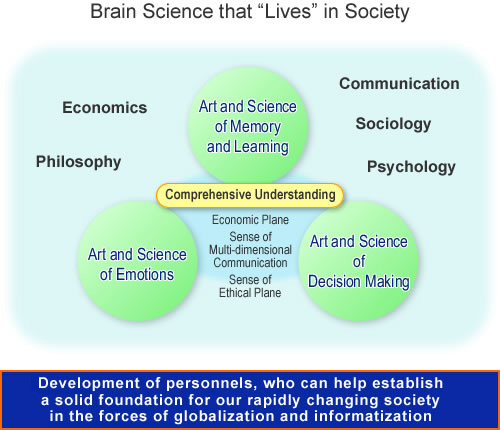- Home
- Program Outline
- Purpose
Purpose
One of the educational philosophies of Tamagawa University is the "Zenjin" education, which means "to incorporate all values of human culture harmoniously into personality". At the same time, Zenjin education must be demonstrated scientifically. According to this philosophy, the Brain Science Research Center of Tamagawa University Research Institute was established in 1996 to advance the scientific understanding of the mankind, and was reorganized into the Tamagawa University Brain Science Institute in 2007.
Understanding the mankind can be interpreted as understanding the human mind. We believe that the human mind reflects the society that has been nurturing it and that the brain unfolds the mind. Therefore, understanding the mind is the same as understanding the functions of the brain onto the society to which it adapts itself. However, to fully comprehend the functions of the brain, it is necessary to consider mechanisms of the society that the brain operates as well as to develop anatomical and physiological understandings (i.e., biological understanding) of the brain. To this end, Tamagawa University Brain Science Institute has been promoting integrative research, consisting of humanities, social sciences, and brain science. Through advances made in brain science research, academic fields related to the human mind and behavior are about to change greatly. Disciplines in humanities and social science, such as philosophy and economics, are not exceptions to this global trend, and we have managed to develop a research environment that attracts global attention by enhancing our organization and facilities through the activities of the 21st Century COE Program.
Based on this, our Global COE Program will further promote the integrative cohesive understanding of humanities, social science and brain science through which we can expect a type of future researchers, who are comprehensive and eager to reform conventional disciplines related to the understanding of the human mind. Since we believe that the human mind is unfolded by the brain, it seems that understanding the organ in terms of neuroscience, viz. the scientific understanding of the human mind, should provide the basis to reform the conventional disciplines regarding brain-mind concerns. In particular, providing knowledge for understanding of the mind from the above mentioned perspective is an urgent need of the modern society of our time and we at Tamagawa recognize it as one of the most prioritized subjects as it inherently advocates our grand mission: the Zenjin education. It is fair to say, however, that few educational as well as research centers which actively integrate humanities and science has existed in the country. Therefore, we aim to establish a global research center of understanding the social mind by integrating Tamagawa's comprehensive research orientation and its constitutive values with that of California Institute of Technology (Caltech), the worldwide leader in trans-disciplinary research across humanities and sciences.
As an extension of our interdisciplinary research, we aim to create an education and research centers that, among various social brain functions, in particular strives to reveal 1) the economic rationality and irrationality of human behaviors, 2) the sense of ethics and morals of mankind, and 3) the construct of interpersonal relationships through communication. Furthermore, by further integrating brain science with humanities and social sciences, we aim to establish a research center that can foster researchers dedicated to conducting brain science research, capable of reorganizing scientific fields related to the human mind, and willing to share the fruits with society.

Desired Characteristics
- Researchers who can cultivate new sciences of the mind
- Educators who possess a new sense of mankind and society
- Engineers who can respond to and cultivate new social needs
